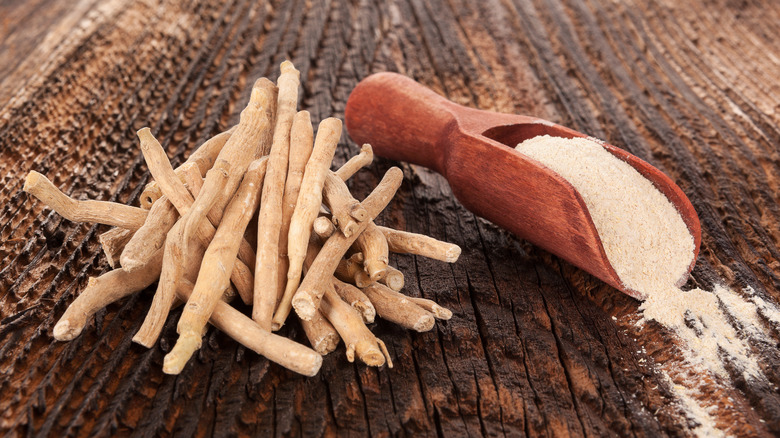Does Ashwagandha Help With PCOS Symptoms?
Ashwagandha, also known as Withania somnifera, is a plant that has been used for centuries in traditional Ayurvedic medicine, says Healthline. Extracts of the plant are available in various forms, including capsules, powders, and teas. The roots and leaves are used in traditional medicine to treat various ailments. Research has suggested that ashwagandha may have several potential health benefits, especially for stress reduction. For this reason, the plant has been classified as an adaptogen — it is believed to work by regulating levels of cortisol, a hormone released in response to stress.
In recent years, ashwagandha has gained popularity as a natural supplement for various health concerns. Some people also believe it may help relieve various symptoms associated with polycystic ovary syndrome (PCOS). According to Johns Hopkins Medicine, this hormonal disorder affects women of reproductive age — women with PCOS have higher than normal levels of androgens (male hormones), which can lead to a range of symptoms such as irregular periods, weight gain, acne, and excessive hair growth. In addition to the hormonal imbalances, women with PCOS may also have enlarged ovaries that are unable to release eggs regularly, leading to infertility or difficulty getting pregnant, explains the National Health Service (NHS).
Ashwagandha may help some PCOS symptoms, but might worsen others
Anxiety and stress levels in women with PCOS are often elevated due to the hormonal imbalances associated with the condition, says Healthline, and this is something that ashwagandha can be helpful in managing. For example, one 2019 study published in the journal Cureus found that it may help reduce stress and anxiety.
According to the Mayo Clinic, low-grade inflammation is another symptom associated with PCOS. One 2018 study published in the International Journal of Molecular Medicine found ashwagandha root to have anti-inflammatory properties. These properties also make it useful in treating conditions such as arthritis, explains Medical News Today.
However, ashwagandha may also worsen certain symptoms associated with PCOS. One 2015 study published in the journal BioMed Research International notes that ashwagandha may increase testosterone levels in women. Elevated testosterone levels are already common in those with PCOS, so any additional amount may exacerbate symptoms associated with that imbalance.
The recommended dosage for ashwagandha is typically between 250 mg to 3 g per day, taken in divided doses, according to Healthline. As with any supplement, it's always advisable to speak to your doctor before using ashwagandha or any other herbal medicine to your regimen. They can help determine the optimal dosage and duration of treatment. Also, note that some herbs, including ashwagandha, may interact with certain medications or have other adverse effects.
Alternative treatment options for PCOS
Besides ashwagandha, one of the primary methods for managing PCOS is through lifestyle changes. Making changes to your diet and exercise habits can be effective. Johns Hopkins Medicine advises eating a balanced diet that is rich in whole foods and low in processed and sugary foods — this can help regulate blood sugar and insulin levels, which are often elevated in women with PCOS. Regular moderate exercise can also help support weight loss.
Several medications can be used to treat PCOS. According to the Mayo Clinic, birth control pills can help regulate menstrual cycles and reduce the number of androgens in the body. This may improve symptoms such as acne and excessive hair growth. Metformin, a medication commonly used to treat type 2 diabetes, can also help manage insulin resistance and regulate menstrual cycles.
If you are struggling to conceive, fertility treatments such as in vitro fertilization (IVF) may be necessary. This treatment can help stimulate ovulation and increase the chances of pregnancy, explains the Cleveland Clinic. All in all, the specific treatment plan for PCOS may vary depending on your specific symptoms. It's always best to consult your doctor for guidance on the best treatment options.



